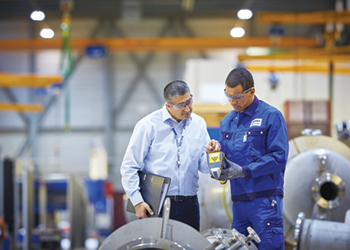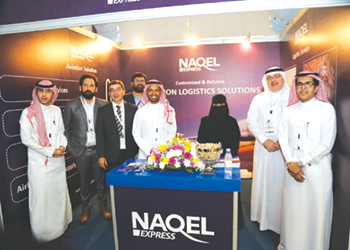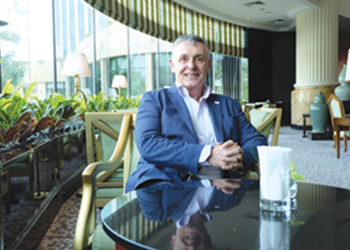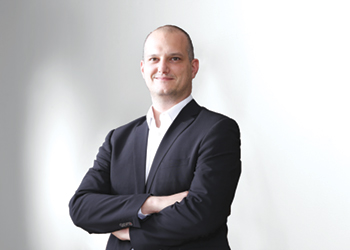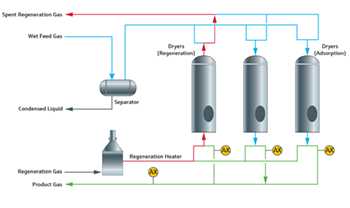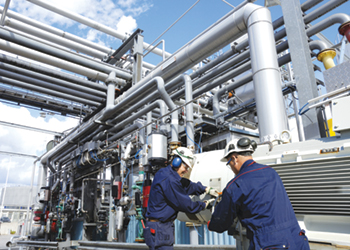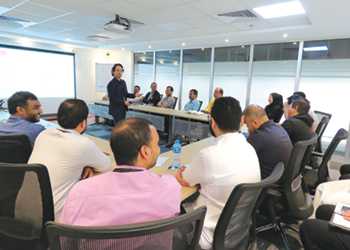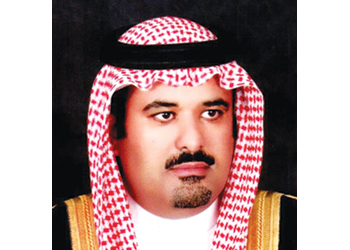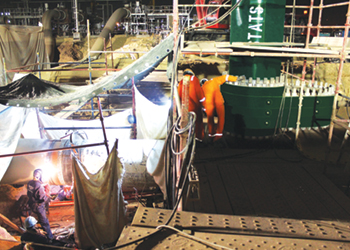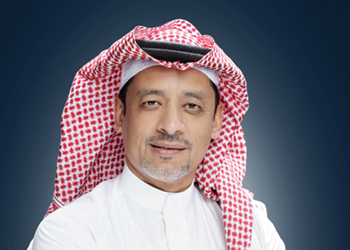
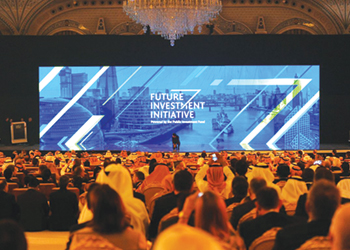 The FII in progress in Riyadh
The FII in progress in Riyadh
The pace of reforms in Saudi Arabia has picked up tremendously and is multifaceted. The reforms have led to significant progress and positive change in a short period of time
Ever since Vision 2030 was launched some three years ago, Saudi Arabia has made great strides towards developing and diversifying its economy. Many sectors and government institutions have been restructured and upgraded, and economic and social reforms have been implemented across the board, notably in the cultural, entertainment and sporting segments.
National oil company and the world’s biggest oil exporter, Saudi Aramco is a key player in the government’s programmes to realise Vision 2030. Aramco President and CEO Amin Nasser says: 'Aramco is a leading supporter of Saudi Vision 2030 by helping to diversify the local economy, adding more value domestically, assisting in kingdom industrialisation, promoting job creation, helping in national capacity building, and promoting entrepreneurship.'
Saudi Aramco participated as a strategic sponsor in the second annual Future Investment Initiative (FII) 2018, a key gathering of senior global and domestic business and policy leaders held in Riyadh under the patronage of the Custodian of the Two Holy Mosques King Salman.
FII was an occasion for domestic and global influencers to engage in discussions on a wide range of topics related to the kingdom’s economy, and the opportunities for business collaboration between Saudi and international business entities from several economic sectors.
 |
Nasser ... Aramco is a leading supporter of Saudi Vision 2030 |
'FII is an ideal and beneficial platform to attract international investments and to capitalise on new opportunities that are fast emerging with Saudi Vision 2030. Saudi Aramco is playing an integral role, alongside many national entities and stakeholders, in enabling new industrial and business partnerships in the kingdom thanks to its position as a global energy powerhouse, and as reflected in our major investments and partnerships globally, not only in core oil and gas and downstream, but also in pursuing advanced technologies and energy-related value adding activities,' Nasser adds.
He says the pace of reforms in the kingdom has picked up tremendously and is multifaceted. The reforms have led to significant progress and positive change in a short period of time. The future of investment in the kingdom is promising.
According to Tadawul, the Saudi economy has greatly improved its economic and business rankings. For example the Rating agency Moody’s has maintained Saudi Arabia’s A1 positive rating with a stable outlook. It also increased its economic growth estimate for 2019 from 2.5 per cent to 2.7 per cent, which reflects a healthy economy on a pattern of steady growth.
In addition to that, according to the World Economic Forum 2018 Global Competitiveness Report, the Saudi economy saw major improvements in its overall position and the ease of doing business. The report ranked the kingdom 39th on its list of 140 economies, achieving its best progress since 2012. The Saudi financial market governance index has moved up to 5th position in 2018 from 77th in 2017, showing the best performance among Arab countries, and the second best among the G20.
At the FII, Saudi Aramco signed 15 Memoranda of Understanding (MoUs) and strategic and commercial collaborations valued at $34 billion with 15 international partner companies and entities from eight countries in three continents. These collaborations reflect the range and ambition of Saudi Aramco’s interests, securing its status as the world’s preeminent energy and chemicals company.
Nasser says: 'These agreements support investments in strategic sectors which will further expand the company’s business portfolio while they contribute to the realisation of Saudi Vision 2030. The MoUs will contribute to such areas as refining, chemicals, conversion industries, localisation and related new investment and training opportunities, and job creation. They will also help enable a vibrant energy services sector through the development of the King Salman Energy City, an anchor project which will increase the efficiency and reliability of the supply chain capabilities of the company and that of the kingdom’s industrial base.'
The numbers that have emerged since the country entered this phase of fast-paced development speak for themselves, and they are changing every day for the better. While Saudi Arabia’s non-oil revenues have increased nearly three-fold since 2016, the country is also enjoying steady growth in non-oil exports, which rose from 2.2 per cent in 2017 to 2.5 per cent in 2018. In terms of global competitiveness, Saudi Arabia’s position has also been improving annually.
 |
Al-Amoudi ... driver of foreign capital is going to be good business opportunities |
In January 2019 the launch of the National Industrial Development and Logistics Programme (NIDLP) marked a new beginning for increased localisation of our industrial capabilities and in-country manufacturing facilities. The programme aims to boost investment in key sectors like mining, industry, energy and logistics, and is currently worth more than $453 billion. By 2030 this programme alone is expected to add 1.6m jobs to the labour market. Indeed, the NIDLP is a cornerstone for creating employment opportunities and increasing the value of Saudi non-oil exports in the long term.
Saudi Arabia’s fiscal budget for 2019 is set at more than SR1 trillion ($266.6 billion), which is the largest in the history of the country and represents a roughly 7 per cent increase above spending in 2018. The budget for 2020 will continue this trend and will be bigger still. The government spending rate, including both capital and operational expenditures, is increasing significantly, while the salaries of public sector workers are decreasing. In 2016 salaries made up 50 per cent of the government budget; in 2019 we expect this rate to reach a record low of 45 per cent. The unemployment rate will continue to improve on a yearly basis until it declines to 7 per cent in 2030.
Through the Public Investment Fund (PIF), Saudi Arabia has been establishing one of the largest sovereign wealth funds in the world. Assets under the PIF’s management totalled $300 billion in 2018 and are expected to grow to over $400 billion in 2019. The objective of the PIF is for it to reach $2 trillion by 2030.
The PIF focuses on strategic and high-yield investments across a wide variety of sectors, both inside and outside Saudi Arabia. To support the growth of the private and non-oil sectors, the PIF is expected to raise capital by releasing an equity stake that it currently holds in the publicly traded petrochemicals manufacturer Saudi Arabian Basic Industries, which is scheduled to be acquired by Saudi Aramco, the state-owned oil giant.
All the mega- and giga-projects that have been launched since 2016 under Vision 2030 are well under way, including Neom, the Red Sea Project and Al Qiddiya project. Those projects are unique to Saudi Arabia, but business opportunities are to be found for the kingdom across the region as well.
Rapid changes in the income diversification in the Saudi economy are a milestone in the indicators of the thorough transformation industry represented by Vision 2030 announced by the state and included a myriad of programmes and initiatives.
What can be wagered on in this respect is the change in the traditional patterns prevailing since the inception of the kingdom, whose main engine was oil. This does not tarnish that phase because the state by the time was under construction as focus was on infrastructure in all development sectors, let alone the numerous difficulties of transformation from a society that depends entirely on jobs and services provided by the State.
Saudi Transport Minister Nabil bin Mohammed Al-Amoudi believes that foreign investors will want to be involved in the huge National Industrial Development and Logistics Program (NIDLP) announced in Riyadh because it makes sound business sense.
'I think the driver of foreign capital is going to be good business opportunities, and the key to that is a healthy, vibrant and sustainable economy, which we have. The reforms were about ensuring that was sustainable over the long term,' he says.
The kingdom unveiled a 10-year strategy that would transform its industrial and economic base, in line with the Vision 2030 plan to diversify away from oil dependency. The strategy aims to stimulate investments worth more than $453 billion across the four key pillars of the Saudi economy. Will the funds — from a mixture of the Saudi government, private investors in the kingdom and global investors — come rolling in.
Meanwhile, most of the executives interviewed for the 2019 edition of the Business Barometer: Saudi Arabia CEO Survey carried out by Oxford Business Group (OBG) were upbeat about the country’s long-term economic prospects, although they also acknowledged the severity of the current challenging global conditions.
As part of its survey on the economy, the global research and consultancy firm asked more than 100 C-suite executives from across Saudi Arabia’s industries a wide-ranging series of questions on a face-to-face basis aimed at gauging business sentiment.
More than four-fifths (82 per cent) of business leaders interviewed says they were confident that the kingdom would successfully achieve the targets laid out out in Vision 2030, Saudi Arabia’s long-term plan to diversify the economy and reduce its dependence on oil. Manufacturing was identified by interviewees as the sector most likely to drive non-oil growth in the short to medium term, chosen by 15 per cent of respondents, closely followed by tourism (12 per cent).
Executives were also largely upbeat about the country’s near-term economic prospects, with 64 per cent describing their expectations for local business conditions over the coming 12 months as either positive or very positive.
Significantly, just over one year on from the introduction of value-added tax in Saudi Arabia, most interviewees reacted favourably when asked for their opinion on the country’s personal and business tax environments. Four-fifths of business leaders surveyed says they thought the tax climate was competitive or very competitive on a global scale, with less than 10 per cent describing it as uncompetitive or very uncompetitive.
However, respondents were also keenly aware of the impact that external factors could have on the country’s economic plans, especially challenges close to home. Almost two-thirds (65 per cent) of business leaders surveyed identified regional political volatility as the top event they felt was likely to weigh on the local economy.





















































































